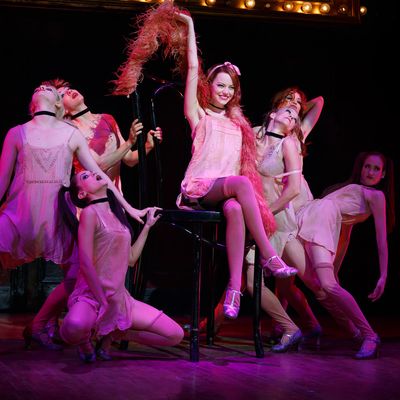
Some 17 Sally Bowleses painted their nails green and sang “Maybe This Time” for the Sam Mendes revisal of Cabaret that ran on Broadway from March 1998 (Natasha Richardson) through January 2004 (Susan Egan). No doubt the Roundabout, which mounted that revisal, as well as the current revival of the revisal, hopes to keep the Kit Kat Klub door revolving. They started this spring with Michelle Williams, who was thrillingly emotional in the part, and have now moved on to Emma Stone, who reportedly had been their first choice. Even aside from Stone’s commercial appeal, you can see why: With her extraordinary face and Mona Lisa smile, her huge celadon eyes and coppery bob, she arrives prepackaged with the kind of remote fascination a Sally Bowles needs.
And indeed, she looks terrific as the none-too-bright young thing in William Ivey Long’s pastel frocks and diaphanous lingerie. What fun! you think as she arrives onstage in a pink marabou-trimmed sleep set for “Don’t Tell Mama,” her first number. But then it starts, and she starts, and they are not together. Madly rushing the Charleston tempo and getting pitchy on the big notes, she seems both overexcited and underprepared.
In a way this, too, is very Sally Bowles; we are told more than once that she’s a mediocre performer. And clearly she’s not equipped to face what’s happening around her in 1929 Berlin. But if that sort of casting realism were the standard, the show would not be very entertaining, and the actress playing Sally wouldn’t make it through the first act. (The Mendes rejiggering gives Sally even more bravura songs than she had in the 1966 original.) Successful Sallys suggest her dilettantism and hysteria while still selling the songs and controlling the shape of her decline. Stone ekes it out, getting better as she goes, but in the process blurs the character’s gradations and loses a lot of the laughs. She’s not the kind of girl you want to save but the kind you want to tiptoe away from, quietly, backwards.
That Stone is so much stronger in Act Two than Act One — perhaps she just had a bad case of nerves — bodes well for improvement over the course of her incumbency. (She’s scheduled to play the role through March 29.) But what about the show’s improvement? Even since April, it has grown coarser, and I don’t mean more vulgar. (It’s deliberately vulgar.) At least in the diagetic material, the performance scenes set on the stage of the Klub, it seems to be following the road of least resistance, becoming less a comment on decadence than an example of it. Alan Cumming, in his ninth month as the Emcee, not to mention the year or so he spent in the original, now seems to be phoning it in. Actually, what he’s doing is more complicated if not more appropriate: He’s performing an entertaining riff on the idea of phoning it in, slurring as many syllables as he pronounces and apparently overidentifying with the song “I Don’t Care Much.”
That’s too bad; when the Emcee’s role isn’t in sharp focus, a lot of the conceptual strength of the production collapses and everything becomes pointlessly ironic. (Well, not everything: Danny Burstein and especially Linda Emond, as the older couple in the traditional book scenes, are still sterling.) Because of its grave subject, Cabaret is a show that can’t afford this kind of sloppiness. The red swastika painted on Cumming’s ass — a shocker, once — is getting dangerously close to being kitsch.
Cabaret is at Studio 54.

